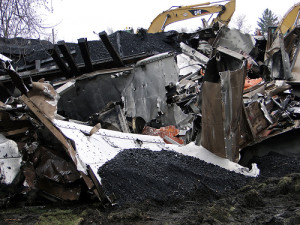We have much more to do and your continued support is needed now more than ever.
Loaded Coal Train Derails Near Columbia River Gorge
Add the Columbia River Gorge region to the list of places Big Coal is using for a punching bag, joining Appalachia, the Powder River Basin in Wyoming and Montana, and hundreds of other sites around the country. From the Associated Press:
PASCO, Washington — A railroad spokesman says about 30 cars of a 125-car coal train bound from Wyoming’s Powder River Basin to British Columbia have derailed along a route to the Columbia River Gorge in Mesa, Wash., blocking a main rail line.
…
[Gus Melonas of BNSF Railway Co.] says the majority of the derailed cars ended up on their sides and an undetermined amount of coal spilled. Melonas says no environmental threat was reported.
Wait. “No environmental threat was reported”? Let’s fix that. I want to report an environmental threat right now. Alert: Thirty rail cars filled with coal overturned and spilled their contents! Coal contains mercury, arsenic, and other toxic compounds that pose a serious threat to wildlife and human health. Mix in a couple gusts of wind and there’s your environmental threat right there.

When you consider that at least 19 coal trains have derailed since 2010 (expand the “Coal Dust” tab at this link for more info) it becomes pretty clear that this is a bad idea. And that’s before you consider all the other bad news that goes along with Big Coal’s projects: climate change, ocean acidification, impacts to endangered salmon and orcas…the list goes on.
The railroads and coal companies would love to sweep incidents like this under the rug, but it’s a lot harder than lifting up the corner of the landscape and getting out the broom. So next time you hear things like “no environmental threat,” you might want to ask who’s doing the reporting.
![]() Help us stop Big Coal’s march through crucial ecosystems like the Columbia River and Puget Sound. Speak up now to protect Orcas and other wildlife in the Pacific Northwest!
Help us stop Big Coal’s march through crucial ecosystems like the Columbia River and Puget Sound. Speak up now to protect Orcas and other wildlife in the Pacific Northwest!




















